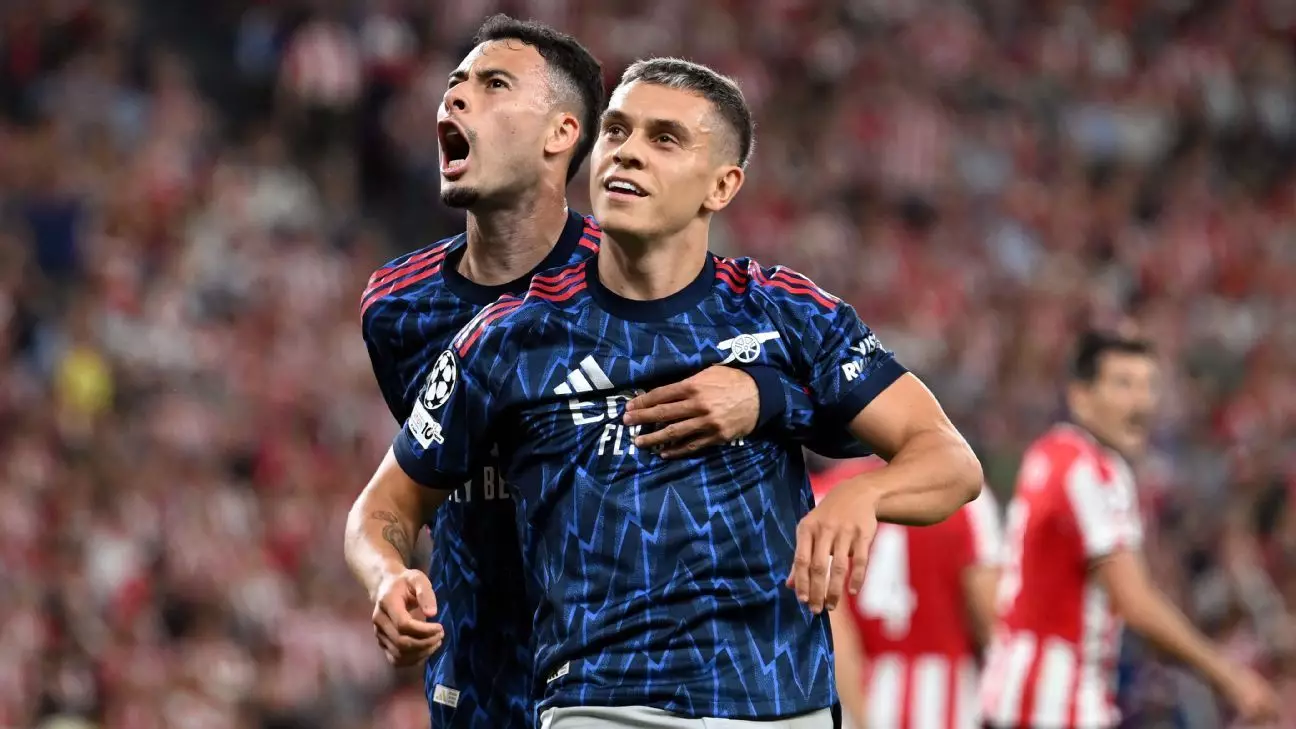In the world of European football, few stories captivate the imagination quite like Arsenal’s recent transformation. Once doubted for their inability to step up in the most prestigious competitions, Arsenal now stands on the brink of rewriting their legacy. Their recent victory against Athletic Club in Bilbao exemplifies this shift—not just through the result but through a compelling demonstration of strategic depth and mental resilience. The significant change is rooted in a clear understanding: football at the highest level demands more than talented starters; it requires a relentless squad capable of making decisive impacts from the bench.
This realization is exactly what sets Arsenal apart this season. After a summer investment that exceeded £300 million, the club’s revamped squad becomes a formidable force, not merely on paper but on the pitch. The depth of quality now available to Mikel Arteta allows him to make tactical substitutions that can alter the course of a game, a luxury previously missing from their repertoire. Gone are the days when a few key players carried the burden; now, Arsenal boasts a roster ripe with potential game-changers, ready to seize moments of opportunity and turn the tide in their favor.
The Power of Impact Substitutions: A Tactical Evolution
The match against Athletic Club was a revealing showcase of how modern football has evolved. Arteta’s decisions to introduce Leandro Trossard and Gabriel Martinelli in the second half paid immediate dividends, illustrating a pivotal shift in team management philosophy. Their entrance, both tactical and psychological, shifted the momentum decisively in Arsenal’s favor. Within seconds—yes, just 36 seconds—Martinelli found himself celebrating a goal, a tangible symbol that the new age of Arsenal football is one where impact substitutes are not secondary but central to their strategy.
This approach echoes historic examples from the Champions League’s rich history—moments where late goals from replacements have sealed victories. Think of Ole Gunnar Solskjaer’s winning goal in the 1999 Manchester United final or Divock Origi’s critical contributions for Liverpool. More recently, Real Madrid’s tactical use of versatile substitutes has been crucial to their continued success. Arsenal’s management now recognizes the value of these players—those who, with proper confidence and preparation, can change a game’s outcome almost instantly. Arteta’s comment that “sometimes the finishers will be more important than the starters” underscores a revolutionary understanding: a team’s strength lies not just in its initial lineup but in its ability to capitalize on fresh legs and renewed energy at crucial junctures.
Transforming the Squad: From Near Misses to Genuine Contenders
Reflecting on last season’s Champions League exit at the hands of Paris Saint-Germain, it becomes evident how much Arsenal’s fortunes have improved. The setbacks were mainly due to a lack of suitable bench options—players who could make a difference when called upon. The squad’s depth was insufficient, and the result was a bitter pill to swallow, especially when high-impact players like Jorginho, Zinchenko, and Sterling were unavailable or underperforming.
This season, the landscape has shifted dramatically. Arsenal’s summer transfer window fortified their squad with players like Gyökeres, Eze, and Noni Madueke—individual talents that, on their own, could shift the momentum. But more importantly, the squad now has a roster capable of sustained excellence; a genuine firepower that extends well beyond the starters. The presence of reliable substitutes such as William Saliba, Ethan Nwaneri, and even young prospects like Max Dowman demonstrates the club’s strategic depth—an arsenal of talent that makes Arsenal a different animal altogether.
Psychological and Strategic Advantages on the European Stage
The significance of having an influential bench extends beyond mere tactics—it’s a psychological asset. Teams facing Arsenal now know they cannot solely rely on a handful of star players. The knowledge that Arsenal can call upon fresh, highly competent substitutes to turn the game in their favor creates doubt and pressure for opponents. This mental edge could be decisive in high-stakes knockout matches, where pressure often unravels less well-equipped teams.
However, despite the impressive depth, questions linger around the team’s ability to maintain consistency. Key players—such as Odegaard, Saka, and Havertz—are still recovering from injuries or adjusting to new roles. Their return could elevate Arsenal even further, but until then, the current squad’s resilience and strategic flexibility remain vital.
This evolving squad philosophy signals a broader transformation in Arsenal’s identity. They are no longer the team defined by star power alone but by collective strength, tactical sophistication, and a strategic understanding that impact substitutes can be the difference between good and great. If Arsenal harnesses this innovative approach effectively, their aspirations of conquering Europe might finally become reality—no longer an aspirational dream, but an achievable goal rooted in a new, more resilient, and dynamic identity.

